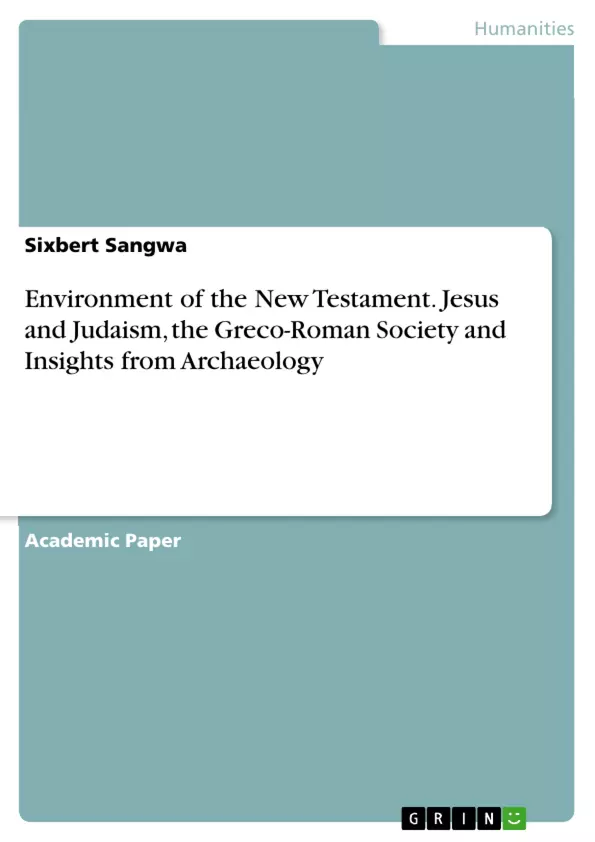The purpose of this paper is to present a comparative analysis of Jesus teachings and the Judaism practices at the time. It also seeks to understand the contribution of Greco-Roman society to the application of the Gospel in modern contexts and to draw lessons from Ephesus to find the limits and contributions of the science of archaeology.
Since the Bible was written to people familiar with the world order, its writers had only occasional reason to include "background" notations. However, for those of us who live centuries later, the need for in-depth study is obvious. It is believed that in-depth studies can lead to a better understanding of the biblical text, but studying the environment of the New Testament is not an end in itself. They can broaden one's perspective, allow for more rigorous study of the biblical text, and excite one who is driven by curiosity.
All societies have their predecessors and all build on the foundations of earlier laws, customs, and inventions. This is also relevant for the world of the New Testament, which emerged from an integrated, firm, and complex world. The Gospel witnessed in the New Testament was presented to a monotheistic and polytheistic, rich, and poor, Hellenistic, and traditional Jewish world. However, the Gospel was so universal in scope that it offered a message of redemption for all and yet enabled the redeemed to function as responsible citizens in a pagan society.
Table of Contents
- Jesus teachings and the Judaism practices
- Belief in one God
- Belief in the Holy Spirit and in Messiah
- Belief in the covenant and the Torah
- The relation of Jesus' teaching to the Jewish law
- Temple and Worship
- Judgement and end time
- Conclusion
- Evaluating the contribution of the study of Greco-Roman society to the application of the gospel in modern contexts
- Introduction
- Contribution of the Greek Culture
- Jewish Contributions to Early Christianity
- Old Testament contribution
- Jewish Religious Contributions
- Conclusion
- Insights from Archaeology: What can be learned from archaeology
- Convergences and divergences
- Archaeology shines light on the riot against Paul at Ephesus
Objectives and Key Themes
This paper provides a comprehensive comparative analysis of Jesus' teachings and the Jewish practices of his time, highlighting their convergences and divergences. It aims to understand the influence of Greco-Roman society on the application of the Gospel in modern contexts. The paper also explores the insights that archaeology offers to understanding the New Testament environment.
- Jesus' teachings and their relationship to Jewish law and practices
- The influence of Greco-Roman society on the development of Christianity
- The contribution of archaeology to understanding the New Testament environment
- The application of New Testament teachings in contemporary life
- The impact of social norms on the interpretation and practice of the Gospel
Chapter Summaries
The first chapter explores the similarities and differences between Jesus' teachings and Jewish practices of his time. It examines their shared beliefs in one God, the Holy Spirit, the covenant, and the Torah, while highlighting key differences in interpretation and emphasis.
The second chapter delves into the contribution of the study of Greco-Roman society to the application of the Gospel in modern contexts. It explores the influence of Greek culture and Jewish contributions, including the impact of the Old Testament and Jewish religious practices on early Christianity.
The third chapter examines the insights that archaeology provides into the New Testament environment. It analyzes the convergences and divergences between archaeological findings and biblical accounts, using the example of the riot against Paul at Ephesus to illustrate the potential of archaeology to shed light on historical events.
Keywords
The primary focus of this paper lies on the interconnectedness of Jesus and Judaism, the New Testament and Greco-Roman society, and the application of these insights in contemporary life. It explores the role of archaeology in illuminating the New Testament environment and the impact of social norms on the interpretation and practice of the Gospel. Key terms include: Jesus and Judaism, New Testament and Greco-Roman Society, New Testament and Contemporary Life, Archeology and the New Testament, the Gospel and Social Norms.
Frequently Asked Questions
How did Jesus' teachings relate to the Jewish law of his time?
Jesus' teachings were deeply rooted in Judaism, sharing beliefs in one God, the Holy Spirit, the covenant, and the Torah. However, he often offered different interpretations and emphases compared to traditional Jewish law and temple worship.
What was the influence of Greco-Roman society on early Christianity?
Greco-Roman culture provided the linguistic and social framework for the spread of the Gospel. Greek culture influenced early Christian thought, while the Roman infrastructure facilitated the movement of missionaries like Paul.
How does archaeology help in understanding the New Testament?
Archaeology provides historical context and physical evidence that can confirm or illuminate biblical accounts. It helps bridge the gap between ancient texts and the modern world by revealing the social and physical environment of the time.
What can we learn from the archaeological findings in Ephesus?
Archaeology in Ephesus sheds light on historical events such as the riot against the Apostle Paul. It helps define the limits and contributions of science in verifying biblical narratives.
Why is it important to study the Jewish background of the New Testament?
Since the Bible was written within a specific world order, understanding Jewish customs, laws, and inventions is essential for an in-depth and accurate interpretation of the biblical text.
- Quote paper
- Dr. Sixbert Sangwa (Author), 2021, Environment of the New Testament. Jesus and Judaism, the Greco-Roman Society and Insights from Archaeology, Munich, GRIN Verlag, https://www.grin.com/document/1021016



